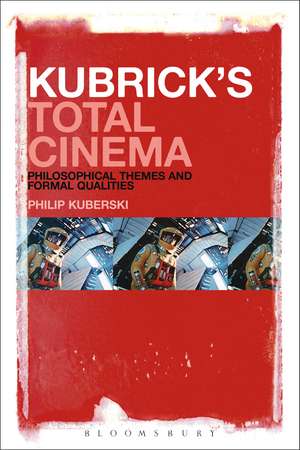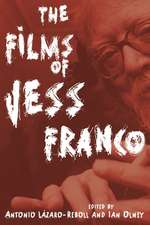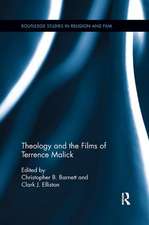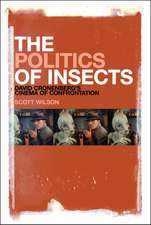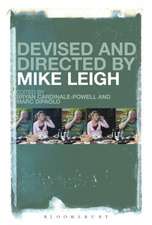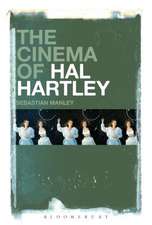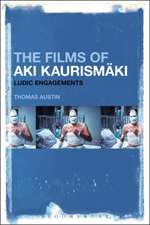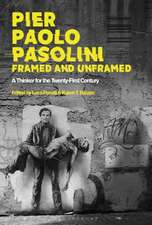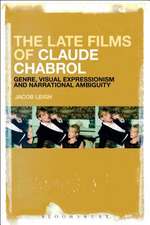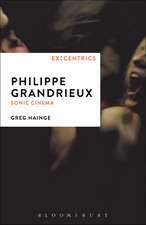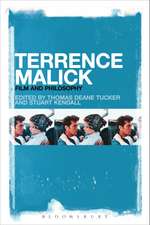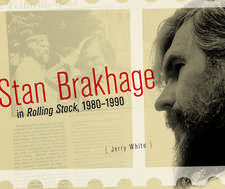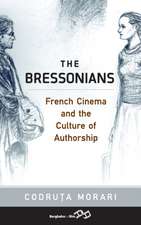Kubrick's Total Cinema: Philosophical Themes and Formal Qualities
Autor Philip Kuberskien Limba Engleză Paperback – 12 feb 2014
| Toate formatele și edițiile | Preț | Express |
|---|---|---|
| Paperback (1) | 190.50 lei 6-8 săpt. | |
| Bloomsbury Publishing – 12 feb 2014 | 190.50 lei 6-8 săpt. | |
| Hardback (1) | 831.03 lei 6-8 săpt. | |
| Bloomsbury Publishing – 10 oct 2012 | 831.03 lei 6-8 săpt. |
Preț: 190.50 lei
Preț vechi: 248.91 lei
-23% Nou
Puncte Express: 286
Preț estimativ în valută:
36.46€ • 37.92$ • 30.10£
36.46€ • 37.92$ • 30.10£
Carte tipărită la comandă
Livrare economică 12-26 aprilie
Preluare comenzi: 021 569.72.76
Specificații
ISBN-13: 9781628929478
ISBN-10: 1628929472
Pagini: 208
Dimensiuni: 152 x 229 x 15 mm
Greutate: 0.3 kg
Editura: Bloomsbury Publishing
Colecția Bloomsbury Academic
Locul publicării:New York, United States
ISBN-10: 1628929472
Pagini: 208
Dimensiuni: 152 x 229 x 15 mm
Greutate: 0.3 kg
Editura: Bloomsbury Publishing
Colecția Bloomsbury Academic
Locul publicării:New York, United States
Caracteristici
Studies philosophical themes and cinematic qualities and suggests ways in which they relate.
Notă biografică
Philip Kuberski is Professor of English at Wake Forest University and the author of three books and a number of essays on modern literature and its relations to science, technology, and mythology.
Cuprins
Chapter One: ThinkingChapter Two: CorporealityChapter Three: TimeChapter Four: WarChapter Five: LightChapter Six: ErosChapter Seven: MusicChapter Eight: TechnologyChapter Nine: SpeechChapter Ten: PoiesisChapter Eleven: Transcendence
Recenzii
Philip Kuberski's review of Kubrick's films, Kubrick's Total Cinema, masterfully links the grandest themes of those films to the most intimate of physical details. He shows us Kubrick as the great poet of cinema who shapes his medium to take his viewers ever-deeper into the filmic event of sound, image, and music. In Kubrick we encounter love, war, technology and transcendence in a way that awakens the mind, something Kuberski calls cinematic thought. Deeply informed by a knowledge of film--as art and as history-as well as by a rich philosophical and literary past that Kubrick drew upon, Kuberski gives the films a resonance that is both enlightening and moving. He drew me back into Kubrick, revealing Kubrick's talent for realizing the mysterious in human life through the human moment. His descriptions of eating scenes alone make me want to re-watch the films. This book, couched in Kuberski's lucid prose, will please the fan of Kubrick's films, reward the scholar, and seduce the skeptic.
Kubrick's Total Cinema by Philip Kuberski belongs to a vanishingly small number of books that treat the films of Stanley Kubrick with the delicate combination of critical virtues they demand and deserve: a thorough knowledge of the medium of film, a penetrating insight into the aesthetic and philosophical perspectives informing Kubrick's choices, a capacious imagination, and discerning taste. For the first time, Kubrick's cinema is understood in ways that fully acknowledge the cognitive, metaphysical, and spiritual themes that are pertinent to his art as well as the dazzling visual achievements for which the films are justly famous. Kuberski makes a persuasive case for Kubrick not only as an important filmmaker but as one of the great artists of the twentieth century - one who addressed the central aesthetic and moral issues of modernity in a manner that was both artistically unimpeachable and able to reach a popular audience. Kubrick's Total Cinema will find avid readers among those coming to the filmmaker for the first time as well as professionals in critical theory, film studies, and the humanities generally.
Kuberski attempts what would seem to be the impossible - refute standard views of Stanley Kubrick, then propose an entirely new view - and he succeeds[.]He treats film as a means of thinking, a notion that works well for the cerebral Kubrick. Philosophical applications range from Kant to Kristeva, dipping into the Jungian archetype at times. The result is a bold reading that shifts the paradigm on Kubrick's work. Summing Up: Essential.
Kubrick's Total Cinema by Philip Kuberski belongs to a vanishingly small number of books that treat the films of Stanley Kubrick with the delicate combination of critical virtues they demand and deserve: a thorough knowledge of the medium of film, a penetrating insight into the aesthetic and philosophical perspectives informing Kubrick's choices, a capacious imagination, and discerning taste. For the first time, Kubrick's cinema is understood in ways that fully acknowledge the cognitive, metaphysical, and spiritual themes that are pertinent to his art as well as the dazzling visual achievements for which the films are justly famous. Kuberski makes a persuasive case for Kubrick not only as an important filmmaker but as one of the great artists of the twentieth century - one who addressed the central aesthetic and moral issues of modernity in a manner that was both artistically unimpeachable and able to reach a popular audience. Kubrick's Total Cinema will find avid readers among those coming to the filmmaker for the first time as well as professionals in critical theory, film studies, and the humanities generally.
Kuberski attempts what would seem to be the impossible - refute standard views of Stanley Kubrick, then propose an entirely new view - and he succeeds[.]He treats film as a means of thinking, a notion that works well for the cerebral Kubrick. Philosophical applications range from Kant to Kristeva, dipping into the Jungian archetype at times. The result is a bold reading that shifts the paradigm on Kubrick's work. Summing Up: Essential.
Descriere
An original study of Kubrick's philosophical themes and cinematic qualities: time, light, speech, music, poiesis, corporeality, war, eros, technology, and transcendence.
